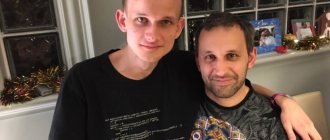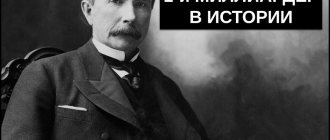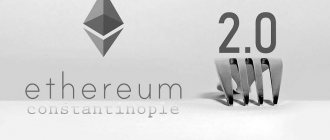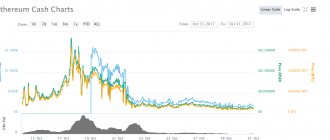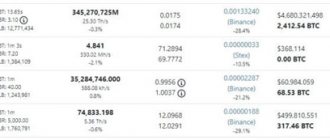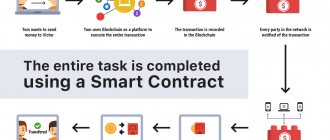The creator of the first cryptocurrency Bitcoin wished to hide under the pseudonym Satoshi Nakamoto. The secret of his personality has not yet been revealed and it is not even possible to say with certainty whether it was one brilliant person or a group of people. But the name of the founder of the second largest blockchain project in terms of capitalization and popularity, Ethereum, is well known. He is one of the TOP 50 most influential young people on our planet and members of his fan club are either jokingly or seriously nicknamed “Vitalik’s Witnesses.”
The biography of the founder of the digital currency Ethereum (ETH) is of interest to many Russians, which is understandable. Vitalik Buterin is one of the best programmers of our time, who has made a technological revolution in the global IT industry. A man with an extraordinary mind and organizational skills, who already at 17 became the co-founder and leading author of Bitcoin Magazine, and 5 years later launched a crypto platform.
Childhood
On January 31, 1994, in the city of Kolomna near Moscow, a son, Vitalik, was born to senior students Dmitry Buterin and Natalia Amelina. While his parents were finishing their studies, the boy grew up under the supervision of his grandparents.
At the age of 4, the future founder of Ethereum received his first computer as a gift and, as befits a brilliant child, instead of playing shooters or adventure games, he began to develop macros based on Excel.
When the money ran out
Initial Coin Offering (ICO) - initial placement of coins. Launching the project’s own cryptocurrency - a token or branded coin, which can only be used within the company’s architecture, for example, in a certain territory. By purchasing a token, an investor invests in the development of the project, but the benefit from the investment will only come when the project starts operating and is able to fulfill the conditions stated during the ICO.
It’s hard to believe now, but just a couple of months after the launch, the founders of Ethereum were faced with a lack of money. All savings were spent on travel, lawyers and company registration. Instead of taking out loans, the founders decided to rely on crowdfunding and sell some ether pegged to Bitcoin. In fact, they decided to launch an ICO.
At the start, they sold two thousand ethers for one bitcoin. At the then price of $600 per Bitcoin, the founders received 30 cents per Ethereum token, but Ether did not sell so cheaply for a very long time - demand instantly pushed its price up.
Photo: Manuel Romano / ZumaPress / Globallookpress.comzuma
In the first 42 days of trading, Ethereum was able to sell 31 thousand bitcoins worth of ether, or $18.4 million - one of the largest ICOs at that time. “The interest was real, it wasn’t just chatter. At that moment, I felt mixed feelings of pride and responsibility,” Buterin shared his impressions.
The launch of tokens, that is, ether, that is, cryptocurrency, was not the goal of the developers, since their product is much broader, and the scope of its application goes far beyond the scope of a payment service. The founders of Ethereum define their brainchild as “publicly available software that is protected from unauthorized access.” Ethereum was created as a platform for decentralized applications and smart contracts, the functionality of which can be used by everyone.
Emigration
In 1999, Vitalik’s parents divorced, and he and his father went overseas to the Canadian city of Toronto. Dmitry Buterin strongly encouraged his son's interest in computer science. When he was seven years old, Vitalik created his first virtual system. It was a fairy-tale corner where rabbits lived. Their existence was regulated by graphs, mathematical formulas and equations, which the owner of the virtual world instantly solved without any auxiliary means.
In 2004, Vitalik mastered the C++ programming language and began writing computer games. The most famous of them, Tutoria, has become a stumbling block for avid gamers; only one player in the world, not counting the author himself, managed to complete all levels in it.
After graduating from high school young, the child prodigy continued his studies at “ The Abelard School ”. This is one of the best private pre-university training centers in Toronto. As Vitalik Buterin himself would later say: “It was there that they taught me to think and develop.”
That guy no one talks to
“I remember that I was kind of crazy back then. When I was in fifth or sixth grade, I often thought: Why can't I just get an average grade and be like 75 percent of the rest? - Buterin told about himself.
However, he was not an ideal and diligent student. After graduating from Aberald High School (private school in Toronto, Canada - approx. "Lenta.ru"
) Buterin admitted that he never understood why he should do homework and study in general. However, the involvement of teachers in the process of student development and the level of immersion in subjects of interest to each student contributed to the fact that the school gave a lot to Buterin, although he later criticized the traditional education system.
Image: World of Warcraft screenshot
“I sincerely don’t understand why studying for good grades, although I studied, waste a lot of time instead of getting another level in World of Warcraft,” Buterin wrote on the page of the school from which he graduated. The co-founder of the second most popular and capitalized cryptocurrency calls four years in Aberald “the most productive years of my life”: “Here I was taught to think, reason and learn. This is what should be taught in schools, and not forced to cram facts.”
After graduating from Aberald, in 2012 Buterin entered the University of Waterloo, known for its liberal principles. There, for example, students are not cut off from the work process: the university strives to involve them in various projects so that they can put their acquired knowledge and skills into practice.
At university, Buterin studied programming. At the age of 17, he already received a bronze medal at the International Olympiad in Informatics, and around the same time he learned about Bitcoin from his father. Buterin was very interested in blockchain technology, and he decided to do something of his own.
The creator of Ethereum’s interest in cryptocurrencies and technologies initially manifested itself at the publication level. In one of the bitcoin chats, someone asked him to write for a thematic blog, promising five bitcoins per text (then it was only $3.5). The blog quickly died, but the topic developed. In 2011, Mihai Alisi approached him with a proposal to create a full-fledged publication about cryptocurrencies. So in 2012, Bitcoin Magazine saw the light of day, where Buterin was both a co-founder and chief author. At the same time, the Russian Canadian wrote for fees for other publications.
Photo: Ints Kalnins/Reuters
First steps in the crypto industry
It was Vitalik’s father who first told Vitalik about distributed ledger technology. At first, he was skeptical about the system of mutual settlements with digital money in a peer-to-peer network, but after familiarizing himself in detail with the Bitcoin cryptocurrency and other virtual coins, Vitalik, as they say, was inspired by the idea and became one of the adherents of the crypto industry.
Having thoroughly studied all the available material, he began to independently write analytical articles on the topic of blockchain technologies. Soon he was noticed, and the Romanian programmer Mihai invited him to become a co-founder of the specialized Bitcoin Magazine.
Education and student life
Vitalik went to school in Canada, but by the third grade it became clear that the boy was endowed with an analytical mind. Buterin became interested in mathematics, programming and economics early on.
The parents earned good money; their financial situation allowed them to give their son an excellent education. Therefore, after graduating from primary school, Vitalik was sent to the private school Abelard School. The school was distinguished by a progressive form of organization of the educational process. According to Buterin, it was here that he learned to think and strive for development.
After receiving secondary education, it was not difficult for the young genius to enter one of the best universities in Canada - Waterloo. Vitalik chose computer science as his specialization. But the young man never received a higher education, as he dropped out of school after 2 years.
Ethereum Project
After graduating from the Abelard School, Vitalik Buterin entered the University of Waterloo, but he never managed to complete his studies. The development of a universal blockchain network based on smart contracts became his life’s work.
Having received $100,000 from the Thiel Network , Vitalik left the university and, having assembled a team of like-minded people, including such well-known members of the blockchain community as Mihai Alisi , Anthony Di Iorio and Charles Hoskinson and Gavin Wood , is working hard on the implementation of the Ethereum project . Of course, Thiel’s scholarship was not enough to complete the development; the team conducted a crowdsale campaign and, finally, in 2015, presented a ready-made crypto platform to the community. A year later, the network left the initial alpha version of Frontier and soon the first hard fork took place.
You can talk for a long time about the history of the formation and development of Ethereum from a little-known altcoin to the second largest crypto coin by capitalization, but, perhaps, this is the topic of a separate article.
It is only worth mentioning that in 2022 Vitalik Buterin came to Moscow. The purpose of his visit was preliminary monitoring of the prospects for the introduction of blockchain technologies, including the Ethereum cryptonetwork, into the Russian economy. During the visit, he met with many high-ranking government and Central Bank officials, as well as personally with Russian President Putin.
Early years and youth
The parents of the future cryptocurrency genius were students at the time of their son’s birth. Vitalik’s mother, Natalya Amelina, studied at the Faculty of Economics of the Moscow Institute of Electronic Technology. Upon graduation, she received a diploma in economic analysis.
Vitalik’s father, Dmitry Buterin, having studied at a faculty related to computer science, got a job at the Moscow branch of the American auditing company Arthur Andersen. Dmitry's activities were related to the introduction of new technologies into Russian companies and banks.
Then he went to work for the Danish company Columbus IT, engaged in consulting and implementation of ERP systems. But the crisis that broke out in 1998 forced the company’s founders to emigrate to Canada. A little later, towards the end of 1999, the Buterin family also moved to Toronto. Vitalik was about 6 years old at that time.
His father's profession took its toll on the boy. Already at the age of 4, Dmitry began introducing his son to the computer. The first computer, given to Vitalik by his father, became the boy’s favorite toy. But, unlike most children, Buterin was not interested in video games, but tried to learn various applications on his own. For a boy, there was nothing more exciting than creating macros in an Excel spreadsheet program.
Personal life
In his interviews, the mastermind of Ethereum can talk at length about cryptocurrency and blockchain technologies, but details of his personal life rarely leak to the press. And even then, these are mostly journalistic speculations, not real facts.
Vitalik Buterin does not have an Instagram or Facebook account and rarely attends fashionable parties and social events. Considering his popularity and material well-being, many girls consider him an eligible bachelor, but alas, he is too busy with work.
What's wrong with him now?
Now Vitalik lives and works on his project in Singapore. And although at the very beginning of the project there were only three people involved in it, Vitalik hopes that someday the team will reach such a state that his participation will be required less and less.
He speaks very optimistically about the future, believing that only Ethereum can be the killer of Ethereum. Buterin and his team are preparing new product updates that will be even faster, simpler, scalable, secure, optimized, highly effective, and inexpensive.
Charity
By continuing to work on updating the Ethereum platform, Vitalik Buterin is helping other promising startups develop. He considers the fight against aging of the human body one of the main directions of modern science. In 2022, a non-profit foundation dealing with the problem of aging received approximately $2,500,000 in ETH cryptocurrency from him.
In addition, Vitalik supports the Sens Research Foundation , which is trying to find an effective cure for cancer and other serious diseases (heart pathologies, Alzheimer's ) and the Internet Archive . This is a web platform with a free exchange of information and on which a lot of digitized materials are available.
By the way, employees of the Internet Archive project receive salaries only in virtual coins.
Social activity
In interviews, the programmer has repeatedly stated that he is interested in the topic of immortality. In 2022, the Russian-Canadian billionaire donated $2.4 billion to a foundation that researches age-related diseases. In this way he contributed to the development of anti-aging therapy. Later he transferred another $50 thousand to the SENS account.
During the coronavirus pandemic, Buterin did not stand aside from the global tragedy. He donated $600 thousand to fight the spread of the disease in India, where a record increase in the daily number of infected people was recorded.
Health status
By 2022, the Ethereum project reached its peak and remains second after Bitcoin to this day. Its founder travels a lot in search of the most favorable country for the development of blockchain technologies. Vitalik Buterin spent three years in Switzerland, where he was awarded an honorary doctorate from the University of Basel , but then moved permanently to Singapore.
He communicates quite often with journalists and many of them pay attention to his specific behavior and gestures. Some writers even began to spread fake news about the neurological disease of the young genius, but this is just their speculation.
Vitalik Buterin does not suffer from any serious illness, except for “ digital addiction ,” as he himself described his passion for cryptocurrency. But in fact, he is an ordinary workaholic, passionate about his project. Vitalik is a fan of a healthy lifestyle; he has never smoked or drank alcohol, let alone drugs.
Saw through the blockchain granite
Writing and studying turned out to be not enough for Buterin. Buterin argued with the founders of Bitcoin on the topic of programming, insisting that it was necessary to use a different language - based on a scripting or scripting approach. Buterin was not listened to, but in vain: his approach, which is based on smart contracts, is now of interest to every major bank in the world.
A smart contract is a computer algorithm that allows participants in the blockchain system to conclude a deal, after which the algorithm fully calculates and tracks all movements on it. The technology allows you to create a completely self-sufficient, automatically executed contract, reducing costs, for example, on legal support.
In 2013, he wrote the Ethereum White Paper, a mixture of a policy document and an advertising brochure, which described the key points of the system's operation and revealed the potential benefits for investors.
White Paper is a cross between a policy document and an advertising brochure for a project or company. The document must convince a potential investor or client to buy a product, pay for a service, or invest money in your project.
Shortly before the publication of the White Paper, Buterin traveled around the world and met enthusiasts, programmers and developers like himself. Upon returning to Canada, he had a serious conversation with his father, also a programmer who creates and promotes startups at Blockgeeks Labs. Vitalik said that he wants to leave the university and start his own project. His father still wanted him to finish his studies.
“After graduating from university, you will definitely get an excellent job at Apple, Google, or anywhere,” his father insisted, although he admitted that by leaving university, Vitalik would have a richer and more interesting life, and would be able to learn much more than at university. Just at this time, Vitalik won a grant from the Peter Thiel Foundation in the amount of 100 thousand dollars, and the decision was made: he left the university for Ethereum.
Buterin's funeral
Also in 2022, the entire crypto community was seriously frightened by a fake about the death of Vitalik Buterin in a car accident. After this news, the price of Ethereum immediately fell, which clearly demonstrates the serious role Buterin plays in this project.
One fake post on 4chan scared many traders and Vitalik urgently needed to correct the situation. To refute rumors of his death, he posted a selfie on Twitter holding in his hand a piece of paper with the number of the last transaction on the Ethereum network:
Interesting Facts
Buterin's unusual mathematical abilities manifested themselves in childhood. Not every adult can name the 20 digits of Pi that come after the decimal point, but for 6-year-old Vitalik this was not difficult. And by the 3rd grade, the boy could easily calculate large numbers in his head.
After moving to Canada, the programmer was not in his homeland for many years. His first visit took place in 2016, the purpose of which was to meet with the leaders of the Central Bank.
A year later, the founder of Ether visited the St. Petersburg International Forum, where he met with Russian President V. Putin.
Buterin adheres to a rather extraordinary clothing style. Even at serious conferences, he can be seen wearing a fancy T-shirt and an unusual watch. According to Vitalik, he spent his first earnings on purchasing a T-shirt.
